pune property devlopers
pune property devlopers, pune 1bhk flats, 2bhk flats in aundh, lowest rates flats in pune
Sunday, July 25, 2010
marathi actor and actress: Pari Telang
marathi actor and actress: Pari Telang: "Pari Telang marathi movie, marathi natak and marathi tv serial actress. current work in fu bai fu marathi comedy tv serial. abhalmaya - mar..."
Tuesday, July 20, 2010
Glass House Frames Luxurious

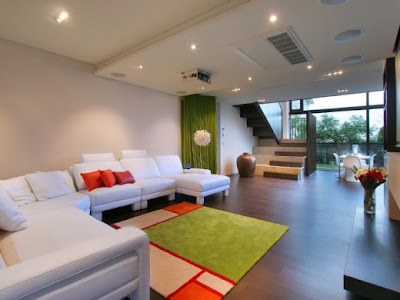




Remuera, a quiet suburb of Auckland, New Zealand, is the home of this contemporary, glass house – a modern beacon among its natural surroundings. This sleek design by Hillery Priest Architecture features expansive windows outlined by bold frames that punctuate their contemporary, geometric shape. A large outdoor deck area overlooks the pool. This modern architectural marvel boasts five bedrooms and five baths, spread out among spacious, open-concept interiors that, like the view from the exterior, bring focus primarily to the windows. But when not peering out into nature, the eye roams across tall angled ceilings, warm woods and rich details throughout.
Pompidou Center Building in Metz by Shigeru Ban
The Centre Pompidou-Metz is the first offshoot of a major French cultural institution – the Centre Pompidou in Paris – in collaboration with regional authorities. The Centre Pompidou-Metz is intended as a unique experience; a place for visitors to engage with artistic creation in all its forms. It is a living venue with events scheduled throughout the year. It is an exceptional place, thanks to the architectural design of Shigeru Ban and Jean de Gastines, and a generous place as the entire project revolves around its public. Lastly, it is a place of excellence, thanks to a multi-disciplinary programming of innovative, world-class temporary exhibitions.


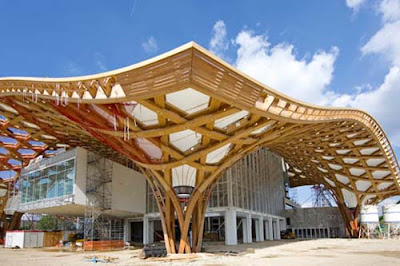
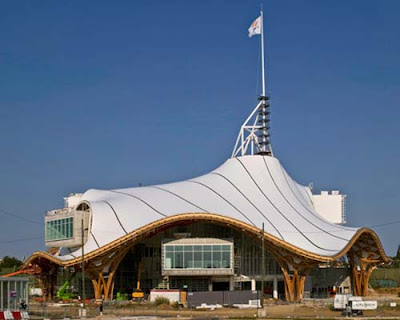
The Centre Pompidou-Metz is a vast modular structure around a central spire rising 77m above ground, a nod to the Centre Pompidou which opened in 1977. The hexagonal roof structure, which echoes the floor-plan, covers a building with a total surface area of 10,700 sq m, including 5,000 sq m of gallery space. Other areas such as the Forum, the restaurant terrace and the garden provide further opportunities to exhibit works. The Centre Pompidou-Metz is surrounded by two gardens and a terrace. This gently sloping terrace provides a direct pedestrian link to the railway station. Partly landscaped, it has the same dimensions as the Piazza in front of the Centre Pompidou. The terrace was designed by Agence Nicolas Michelin Associés and Paso Doble, who also created the garden to the north of the Centre Pompidou-Metz. The five-acre garden is planted with flowering cherries, and its grassy folds enable rainwater to be collected from the roof and terrace. There are also numerous paths for visitors to make their way around and through the park.




The Centre Pompidou-Metz is a vast modular structure around a central spire rising 77m above ground, a nod to the Centre Pompidou which opened in 1977. The hexagonal roof structure, which echoes the floor-plan, covers a building with a total surface area of 10,700 sq m, including 5,000 sq m of gallery space. Other areas such as the Forum, the restaurant terrace and the garden provide further opportunities to exhibit works. The Centre Pompidou-Metz is surrounded by two gardens and a terrace. This gently sloping terrace provides a direct pedestrian link to the railway station. Partly landscaped, it has the same dimensions as the Piazza in front of the Centre Pompidou. The terrace was designed by Agence Nicolas Michelin Associés and Paso Doble, who also created the garden to the north of the Centre Pompidou-Metz. The five-acre garden is planted with flowering cherries, and its grassy folds enable rainwater to be collected from the roof and terrace. There are also numerous paths for visitors to make their way around and through the park.
Pearl Academy of Fashion Building Design by Morphogenesis
 This is the newly-opened Pearl Academy of Fashion located in a predominantly industrial setting in Jaipur, India. The surrounding warehouses and industry led to an ‘introverted’ design, according to the architects. Shallow pools in the courtyards cool the building, which is located in a hot, dry, desert climate.The building has a double skin which creates a buffer zone to reduce direct heat gain. The outer facade, which is perforated, sits 1.2m away from the the main building envelope.Passive cooling techniques reduce the need for mechanical cooling. The internal temperatures can be kept at around 27°C, even when the outside temperature reaches 47°C.
This is the newly-opened Pearl Academy of Fashion located in a predominantly industrial setting in Jaipur, India. The surrounding warehouses and industry led to an ‘introverted’ design, according to the architects. Shallow pools in the courtyards cool the building, which is located in a hot, dry, desert climate.The building has a double skin which creates a buffer zone to reduce direct heat gain. The outer facade, which is perforated, sits 1.2m away from the the main building envelope.Passive cooling techniques reduce the need for mechanical cooling. The internal temperatures can be kept at around 27°C, even when the outside temperature reaches 47°C.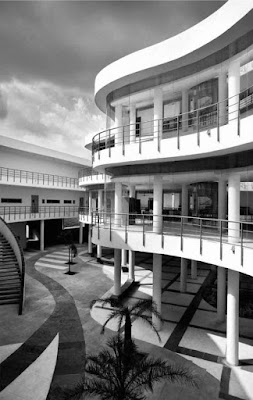


Architecture Building of Red Diamond Dance Theater by Chiasmus Partners
Architecture Building of Red Diamond Dance Theater by Chiasmus Partners
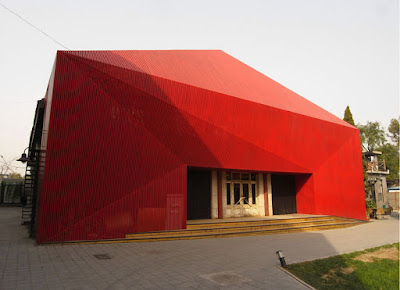
The Red Diamond was until recently used as an old factory complex in the historic DongCheng district of Beijing, CHINA. Chiasmus Partners was assigned the building transformation of this old factory into a dance center with a performance hall, a practice hall and a saloon which would host various events and activities. Chiasmus Partners approached the building transformation by adding an exterior shell to the already existing building. They tried to emphasize the temperament and the character of the new program of the building. They enclosed the old factory by covering it in an evenly –spaced-out red steel tubing shell.
 The red steel tubes create a distorted boundary between the interior and the exterior. The red steel shell has a triangulated approach of design where vectors are pulled away from two focal points to create large triangles. This design allows for the creation of shaded areas on the façade and therefore adds an interesting touch of design to the building exterior. A part of the façade has been left untouched and that is no other than the entrance where the old white vintage door as it is meant to portray the history of the building’s transformation. The concept by Chiasmus Partners was to create the courtyard an outdoor “theater” – a public space that would revitalize the complex, the hutong and its neighborhood.
The red steel tubes create a distorted boundary between the interior and the exterior. The red steel shell has a triangulated approach of design where vectors are pulled away from two focal points to create large triangles. This design allows for the creation of shaded areas on the façade and therefore adds an interesting touch of design to the building exterior. A part of the façade has been left untouched and that is no other than the entrance where the old white vintage door as it is meant to portray the history of the building’s transformation. The concept by Chiasmus Partners was to create the courtyard an outdoor “theater” – a public space that would revitalize the complex, the hutong and its neighborhood.
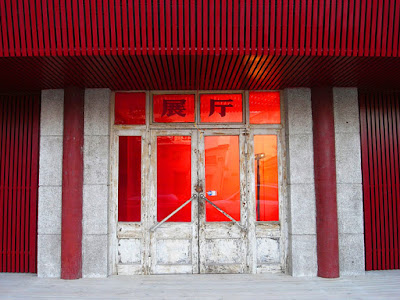




The Red Diamond was until recently used as an old factory complex in the historic DongCheng district of Beijing, CHINA. Chiasmus Partners was assigned the building transformation of this old factory into a dance center with a performance hall, a practice hall and a saloon which would host various events and activities. Chiasmus Partners approached the building transformation by adding an exterior shell to the already existing building. They tried to emphasize the temperament and the character of the new program of the building. They enclosed the old factory by covering it in an evenly –spaced-out red steel tubing shell.
 The red steel tubes create a distorted boundary between the interior and the exterior. The red steel shell has a triangulated approach of design where vectors are pulled away from two focal points to create large triangles. This design allows for the creation of shaded areas on the façade and therefore adds an interesting touch of design to the building exterior. A part of the façade has been left untouched and that is no other than the entrance where the old white vintage door as it is meant to portray the history of the building’s transformation. The concept by Chiasmus Partners was to create the courtyard an outdoor “theater” – a public space that would revitalize the complex, the hutong and its neighborhood.
The red steel tubes create a distorted boundary between the interior and the exterior. The red steel shell has a triangulated approach of design where vectors are pulled away from two focal points to create large triangles. This design allows for the creation of shaded areas on the façade and therefore adds an interesting touch of design to the building exterior. A part of the façade has been left untouched and that is no other than the entrance where the old white vintage door as it is meant to portray the history of the building’s transformation. The concept by Chiasmus Partners was to create the courtyard an outdoor “theater” – a public space that would revitalize the complex, the hutong and its neighborhood.



Great Design Photos of The National Grand Theatre in Beijing
Great Design Photos of The National Grand Theatre in Beijing
 This is Great Design Photos of The National Grand Theatre in Beijing. The project was created by french architect Paul Andreu. Not fare ago the National Grand Theatre was opened. It has simple organic shape, which is terminate by water jump
This is Great Design Photos of The National Grand Theatre in Beijing. The project was created by french architect Paul Andreu. Not fare ago the National Grand Theatre was opened. It has simple organic shape, which is terminate by water jump



 This is Great Design Photos of The National Grand Theatre in Beijing. The project was created by french architect Paul Andreu. Not fare ago the National Grand Theatre was opened. It has simple organic shape, which is terminate by water jump
This is Great Design Photos of The National Grand Theatre in Beijing. The project was created by french architect Paul Andreu. Not fare ago the National Grand Theatre was opened. It has simple organic shape, which is terminate by water jump


Great Architecture Interlace in Singapore by OMA and Partner
 The project design a new housing project in the green ring on the outskirts of the capital of Singapore. This project consists of 31 blocks of 6 storeys high, stacked in a hexagonal order. The result is 170.000m2 departments for 1040.The interesting thing about the strategy used by OMA is the density achieved, while being able to maintain the privacy of the departments by the distance and the view as seen in the renders.
The project design a new housing project in the green ring on the outskirts of the capital of Singapore. This project consists of 31 blocks of 6 storeys high, stacked in a hexagonal order. The result is 170.000m2 departments for 1040.The interesting thing about the strategy used by OMA is the density achieved, while being able to maintain the privacy of the departments by the distance and the view as seen in the renders. Another result of this strategy of stacking spaces are all shown at both the ground and in the decks of the blocks. Seeing the plant project, there are a number of playgrounds with equipment for the community. Thus, the OMA proposal becomes a vertical community, which departs from the typical tower as seen in the render context.
Another result of this strategy of stacking spaces are all shown at both the ground and in the decks of the blocks. Seeing the plant project, there are a number of playgrounds with equipment for the community. Thus, the OMA proposal becomes a vertical community, which departs from the typical tower as seen in the render context.
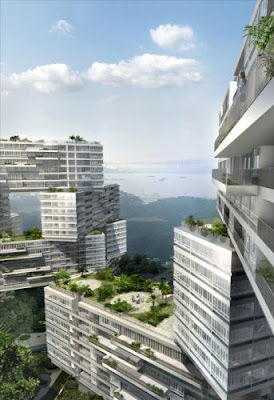 According to OMA account, this design incorporated several variables of solar radiation, winds and the local microclimate, in addition to passive energy strategies of low impact.
According to OMA account, this design incorporated several variables of solar radiation, winds and the local microclimate, in addition to passive energy strategies of low impact.
Subscribe to:
Posts (Atom)